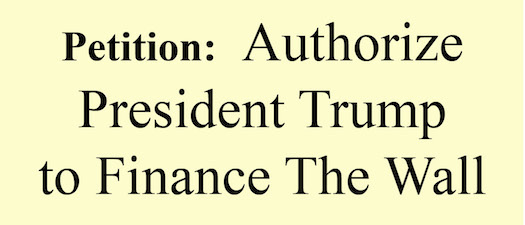FAQs
Q: Is this a serious petition?
A: Is this a serious question? A much better question would be the next one.
Q: Was Trump serious when he promised to build a wall at the border and have Mexico pay for it? Was he serious when he called the immigrants criminals, and specifically, rapists? Was he serious when he said he would repeal Obamacare and replace it with 'something better' when the most detail he offered about his promised plan was the word something, and his entire description of its difference from Obamacare was the word better? Was he serious when he said he could not release his tax return because it was under audit, and that he would release it when the audit was done?
A (short): No, he was lying.
A (long): To say someone is lying implies that they know what the truth is and they know that what they're saying is not it, and they're aware of their intent to deceive. Persons who lie upon occasion, perhaps as the only perceived option in difficult situations, will have some qualms (anxiety, or the discomfort of fear) about their deceptions being exposed. Fear has physiological manifestations (sweat, blood pressure) that are observed by lie detectors.
But in this as in every aspect of humanity, there is great variability. There are outliers, a few extreme cases of individuals who do not have the normal degree of anxiety about being caught in a lie. Some can defeat lie detectors because they manifest no fear of the consequences of lying. These persons are often perceived as having no conscience.
Those of us who are normal (conforming to the norm, most of us) do not wish to live with the anxiety of being caught in a lie, so we adopt honesty as a policy. Truth becomes a virtue, falsity a moral defect. We think about this; we sharpen our perceptions about what is true or real, and what is false. This allows us to communicate with ease with people whom we believe have adopted the same policy, and have the same sense of true and false.
Then if we do lie, we have not only the qualms about the lie being exposed, but anxiety about a broader lie: that of misrepresenting ourselves (to ourselves as well as others) as persons with a policy of honesty. We'd like to continue thinking of ourselves as honest, so we justify the lie; we forgive ourselves for it, because in the given situation there was no other choice. The logic of necessity trumps the virtue of truth.
But again, there are outliers. Some persons have unusually little fear of social rejection for lying. And perhaps in consequence of their lying, they might often feel themselves embroiled in a crisis situation —for which a lie is the only possible response. They develop an extraordinary facility for rationalizing, so quickly feeling the necessity of a certain response that they never consider truth or falsity.
A bias for this mental pattern is found early in life. When an infant begins to perceive itself, it is as an only thing, a unique phenomenon felt from the inside. It is the center of its awareness, and the center of its universe. And the others, which it sees only from the outside, seem entirely different kinds of beings, that exist only to supply its wants and needs.
The human being's great developmental project is to transcend this difference in perspective, and come to understand that these others are quite the same sort of beings as it is itself; and that it is essentially the same as them. It is a difficult project for two reasons. First, it involves losing one's sense of individual uniqueness, with the security it affords in competitions and contentions with others. Second, it is obvious that each individual does have some degree of specialness. By considering only those characteristics that one has oneself in superior degree, one can retain a form of one's infantile notion of uniqueness.
So the project of understanding oneself as one example of a human being among others is fraught; the outcomes are variable. A few outliers continue to hold onto versions of their infantile belief that they themselves are the most important phenomena in the universe, and that all others must recognize it. These are narcissists. The sense of self that they carry —the object of their "I" or "me"— includes the quality of superiority to others. They constantly boast about their own importance and greatness, and expect others to subordinate themselves, because it is essential to them that others confirm their own view. It is a necessity; it transcends truth or falsity.
The narcissistic personality type fits Trump perfectly. His infantile notion of his unique superiority has adapted to and persisted through all of his life experience, because his mind is configured to defend it above all others. Rather than the disembodied sense of truth vs. falsity that most of us have developed, he has only the distinction good-for-the-greatness-of-me vs. bad-for-the-greatness-of-me. He has spent a lifetime relentlessly promoting his name, his image, his brand —hyping everything good-for-Trump, denying everything bad-for-Trump. It is his necessity; truth is irrelevant.
And so he lies, reflexively, automatically. And –excepting a thorough psychological restructuring– he will never be capable of perceiving his lies as lies.
Imagine how Trump would respond if he were asked if he's an honest person. After a review of all his social interactions, one could confidently predict his answer: he certainly is honest, in the extreme.
Given all the evidence of his lying, that would appear to be another blatant lie. But from his perspective, the question alluded to the possibility of a flaw in his character —an attack that must be refuted in the strongest way. The automatic, necessary response is, "I'm actually the most honest person you've ever met."
What about the truth? Well, the debate now is not whether he's honest, but whether he's the most honest person ever.

